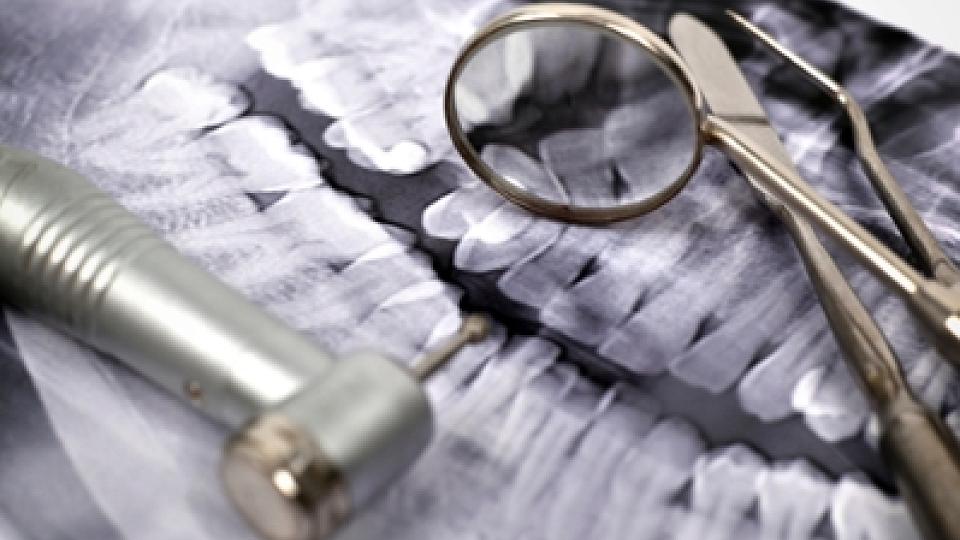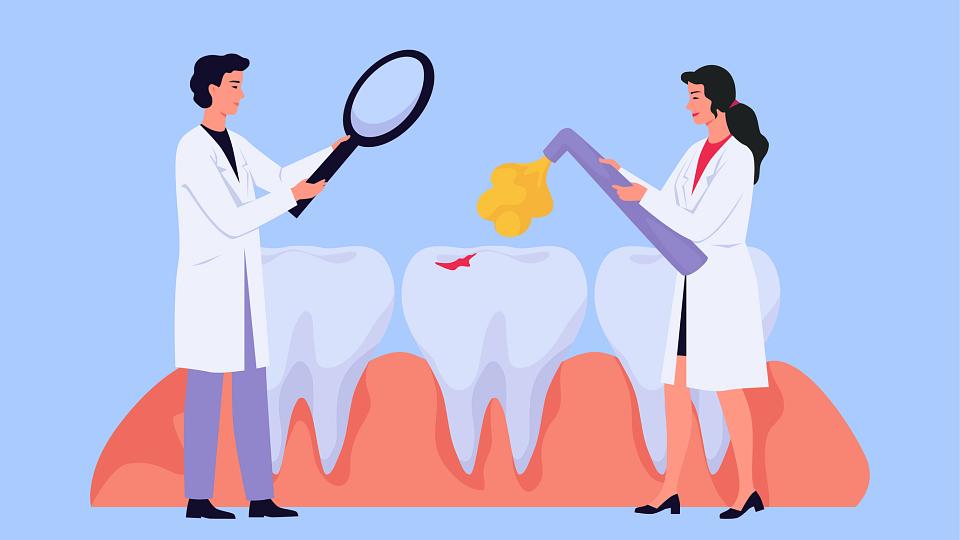
This content was originally produced for audio. Certain elements such as tone, sound effects, and music, may not fully capture the intended experience in textual representation. Therefore, the following transcription has been modified for clarity. We recognize not everyone can access the audio podcast. However, for those who can, we encourage subscribing and listening to the original content for a more engaging and immersive experience.
All thoughts and opinions expressed by hosts and guests are their own and do not necessarily reflect the views held by the institutions with which they are affiliated.
What Causes Tooth Sensitivity?
Interviewer: You have a sensitive tooth. What could it be? Well, we're going to try to narrow that down for you next on The Scope.
Dr. David Okano is an assistant professor at the University of Utah School of Dentistry and it's probably a common thing that people come to dentists for. "I've got a sensitive tooth, what could it be?" And I understand it could be a lot of things.
Dr. Okano: It most certainly could, Scot. The sensitive tooth indicates that the nerve inside your tooth is responding to some type of stimulus on the surface. That could be either a cold sensitivity, hot sensitivity, or sweet sensitivity.
Interviewer: And do those different sensitivities mean different problems?
Dr. Okano: They absolutely would.
Interviewer: Oh, okay.
Cold Sensitivity
Dr. Okano: Correct. Cold sensitivity is not unusual. People will have receding gums, which causes the root to become exposed. The enamel, which is the crown, does not have nerves on the surface, but the root, basically, does have some sensitivity on the surface. So when your root becomes exposed, for example, through recession, it could be cold-sensitive.
Sweet Sensitivity
Interviewer: Okay. And then what about a sweet sensitive?
Dr. Okano: The same thing, it could be sweet sensitivity on an exposed root surface. But it could also be the beginning stages of a tooth decay problem. In other words, a cavity.
Hot Sensitivity
Interviewer: Okay. And then what about the hot sensitivity?
Dr. Okano: Hot sensitivity is a little bit more of a concern. Hot sensitivity could indicate the nerve inside the tooth is starting to go bad, that one of the symptoms of a nerve before it ultimately dies and becomes an abscessed tooth is it goes through a period of hypersensitivity of which hot sensitivity is usually not a good sign. Particularly if it lingers.
When to See a Dentist for Tooth Sensitivity
Interviewer: But generally, cold or sweet wouldn't bother that particular problem?
Dr. Okano: They both could. . .
Interviewer: But if it's something hot, then, really, you need to see a dentist.
Dr. Okano: Yes, actually, for any of the sensitivities, I'd recommend that you see a dentist because cold could be something very early in development. Cold, sweet, and hot could be something very late in the development that would perhaps require root canal treatment.
Other Causes of Tooth Sensitivity
Interviewer: Okay. What are some other causes of tooth sensitivity?
Dr. Okano: Toothpastes, believe it or not.
Interviewer: Oh, okay.
Dr. Okano: Some of these sensitivity toothpastes are great for treating sensitive teeth, but we also know that toothpastes that are formulated for whitening can be abrasive. Smokers' toothpastes are very abrasive. That's how they remove stains, but it can also cause some sensitivity on exposed root surfaces.
Interviewer: All right. In that case, probably discontinue use, I'd imagine.
Dr. Okano: That would be the best recommendation and, again, see your dentist for further follow-up to see if it indicates something a little bit more serious.
Interviewer: So for any of these sensitivities, it could affect just one tooth or is it going to affect all the teeth?
Dr. Okano: It could do either of what you just mentioned. For example, an area of gum recession with an exposed root surface, it may be localized to that tooth. On the other hand, you could have generalized periodontal disease with a lot of bone loss with a lot of gum recession, which would be the symptom of that generalized bone loss and you could have sensitivity throughout the mouth.
Interviewer: Gotcha. Are there other causes of sensitivity? You've given us some of the first ones you'd look at.
Dr. Okano: Sure. The sensitivity we've just been describing relates to exposed root surfaces. You could also have some sore gums that could be a discomfort to the mouth. And sore gums could certainly be related to periodontal disease, another type of dental disease besides tooth decay.
The Importance of Regular Dental Checkups
Interviewer: Is there anything else we need to know about this topic or have we covered it?
Dr. Okano: Well, the lack of symptoms doesn't mean everything is okay. So certainly, see your dentist for preventive treatments and regular examinations to be sure your teeth and gums are healthy. But at the first sign of a symptom, I would certainly share that with your dentist at the next appointment.
Interviewer: All right. Sounds good. How far, usually, after you start noticing symptoms, has the disease, or whatever the issue might be, progressed?
Dr. Okano: That can be highly variable. It could be a very early stage consideration with dental problems that would cause symptoms. On the other hand, with some dental diseases, you may not have a lot of symptoms until it is very advanced and sometimes even too late, where nothing can be done. So the severity of symptoms can be really variable as it relates to the severity of the underlying dental problem.
Interviewer: So if I'm hearing you correctly, if somebody has any sort of tooth or gum or any sort of sensitivity, odds are it's not going to go away.
Dr. Okano: That is correct.
Interviewer: Yeah, and you should go see a dentist right away to prevent further damage.
Dr. Okano: Especially in the early stages. The dental problems, quite often, will not manifest themselves to you as a patient until they're very advanced and sometimes that could even be too late to do any dental treatment. And there's a possibility you could lose the tooth even though you did not have symptoms.
updated: November 7, 2024
originally published: June 29, 2016
5 Health Concerns Associated with Gum Disease You May Not Know About
Daniel Thunell, DMD, board-certified periodontist, explains how inflammation in your mouth could impact your long-term wellness—and what you can do to prevent it.
How to Access Affordable Dental Care
Dental health is crucial, but not always affordable for all budgets. James Bekker, DMD, from University of Utah School of Dentistry, offers an insider's guide to finding and utilizing low-cost dental services.
Understanding Tooth Sensitivity and How to Manage It
Feeling discomfort when eating hot or cold foods? Tooth sensitivity can be more than just a minor annoyance—it could signal a deeper issue. David Okano, MD, breaks down what different...







